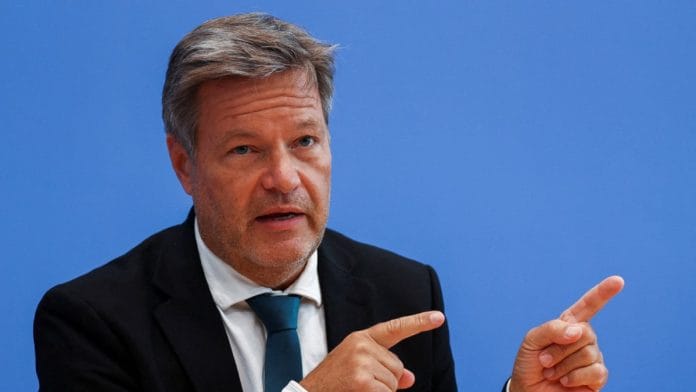New Delhi: Signalling that the European Union (EU) may need a rethink on its approach to free trade agreements (FTAs), German Vice Chancellor and Minister for Economic Affairs Robert Habeck suggested Thursday that a “shortcut” deal, which could focus on specific sectors, could move the India-EU trade negotiations forward.
“Agriculture is the main problem [for the deal]. In Germany around 2 per cent of the population engages in agriculture, while in India it is about 60 per cent of the population. If you have open markets, as that is what a trade agreement does, it could be disastrous for India,” Habeck explained at a press conference here on the eve of the 18th Asia Pacific Conference of German Business, which begins Friday.
Roland Busch, the CEO of Siemens, was also present at the press meet.
Habeck added: “So maybe we can find a shortcut from what the EU has normally done with free trade agreements for the last two decades. The EU has always focused on a comprehensive deal. Maybe we should focus on industry and look to expand to other sectors, rather than have agriculture, services and everything else in one deal.”
India and the European Commission opened the latest negotiations for a FTA in 2022. While a number of leaders and diplomats have spoken of political will to see the agreement through, both sides are yet to arrive at a consensus on a number of issues.
On 12 October, Union Minister for Commerce and Industry Piyush Goyal at the launch of the Federation of European Businesses in India (FEBI) had lambasted the EU’s “irrational standards,” which he said act as non-tariff barriers for Indian companies.
“The very premise [of the Paris Accords] is sought to be demolished by the EU bringing in new elements in the trading relationship. For five or six years now, we have only been negotiating irrational duties, totally against the MFN (Most Favoured Nation) law of the World Trade Organization, which we all agreed to respect on Indian steel,” Goyal had said at the time.
A week before Goyal’s address at FEBI, Union Minister of Finance Nirmala Sitharaman hit out at the bloc’s Carbon Border Adjustment Mechanism (CBAM)–a border tax to be introduced by the EU from 1 January 2026 on seven energy intensive sectors including steel and fertilisers.
At the press conference Thursday, Habeck pointed out that he was informed that India is in the process of developing its own carbon dioxide tax system. “India’s CO2 tax system, if different from the EU, can be recalibrated to match the bloc’s standards,” he said, in what seemed like an effort to diffuse a major upcoming sticking point as the 27-member bloc looks to hit its carbon neutral target by 2050.
German Chancellor Olaf Scholz will be arriving in India late Thursday evening for the intergovernmental consultations scheduled to take place Friday with Prime Minister Narendra Modi.
A number of issues are on the table including expanding the defence partnership between the two countries.
Also Read: India open to new BRICS partners, but says decision should be ‘unanimous’ in hint at Pakistan’s bid
On trade & Russia-Ukraine war
Quizzed on the difference in position of India and Germany on the Russia-Ukraine war, especially in view of New Delhi’s expanding economic partnership with Moscow, Habeck was circumspect.
“When I raise this with my Indian partners, their perspective is that ‘your Russia is our China’. For India it has had armed clashes with China, while the EU continues to trade heavily with the country. Similarly, India trades with Russia as the EU has an issue with the country. Mind you this is the Indian perspective,” explained Habeck.
However, despite the differences on this conflict, Habeck was more effusive in his statement on the “promise” of India for Germany’s economic future, especially from a trade perspective.
“Globalisation is changing across the world … from a trade perspective India is very promising for our future. It also has a large number of people entering the labour market every year … we would benefit from your talent, but at the same time we do not want to steal them,” said the German vice chancellor.
For the current government in Berlin, the idea is to have Indians who seek jobs in Germany, being welcomed into the country with the hope that in maybe 10 or 12 years they will return to India, bringing with them the expertise gained in the European economic powerhouse.
In a focus paper adopted by the German cabinet last week, labour mobility is a key focus of Berlin’s new perspective towards India.
Also Read: India unlikely to send representative to Canada for NSA-level meet on Russia-Ukraine war






